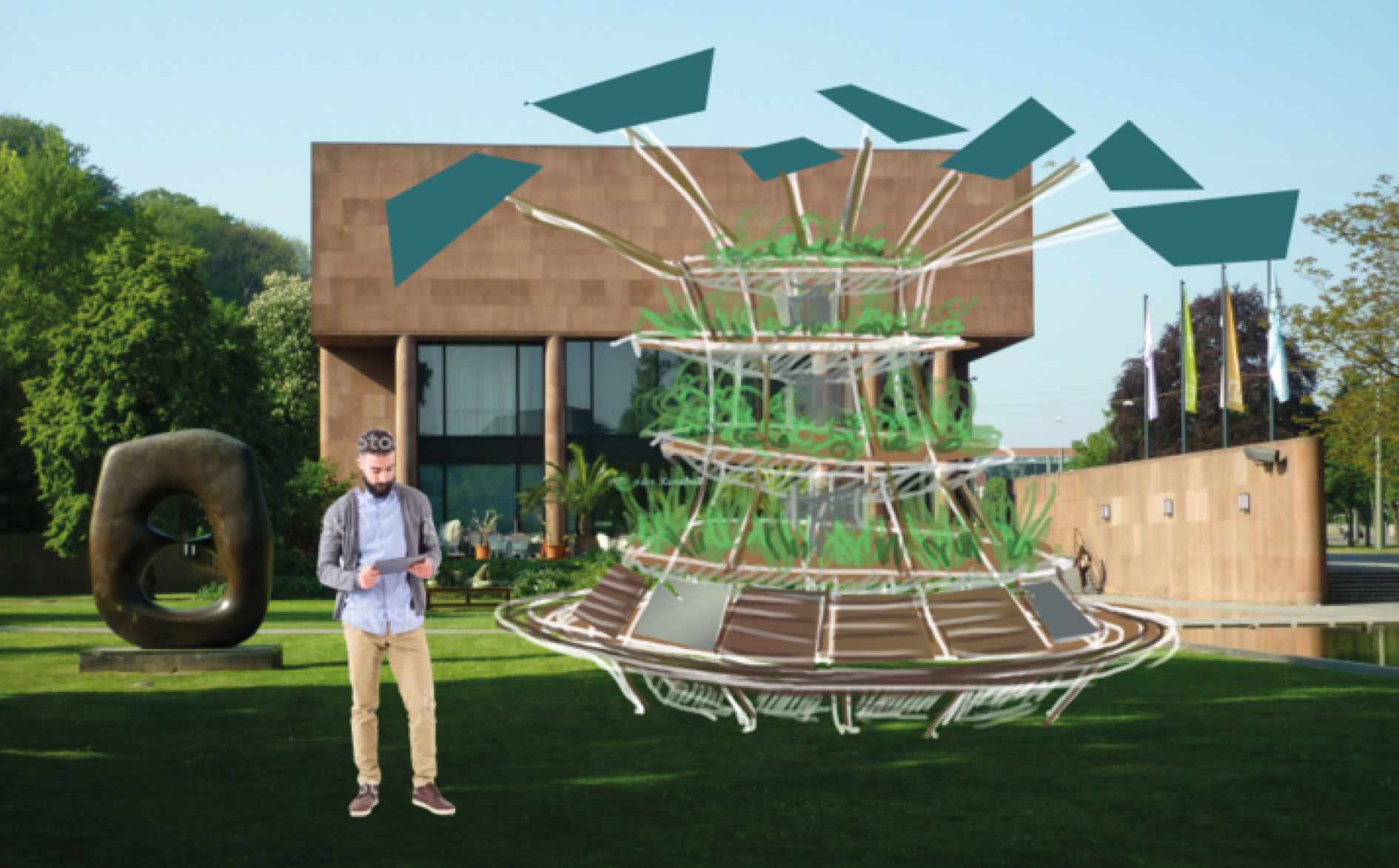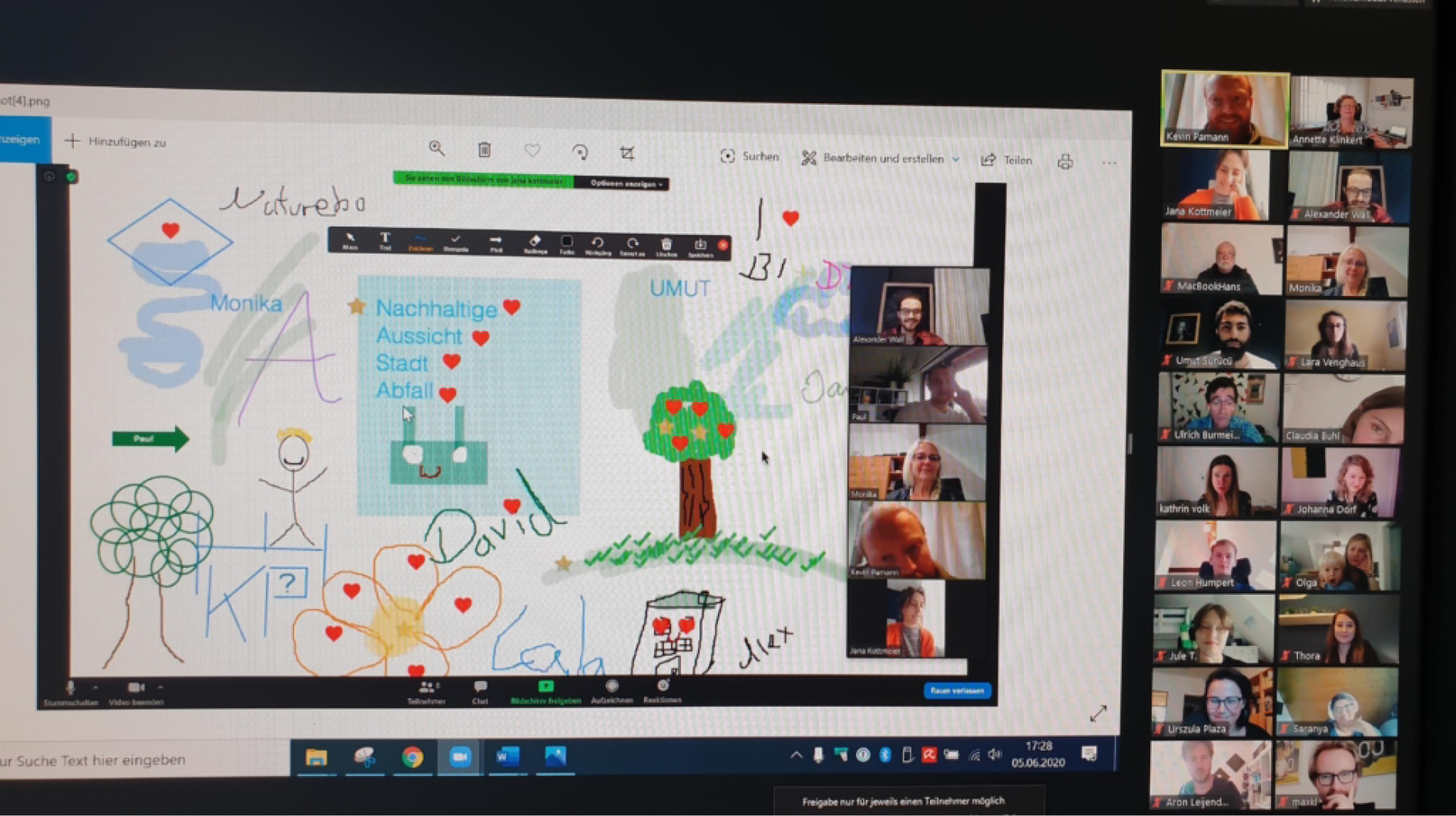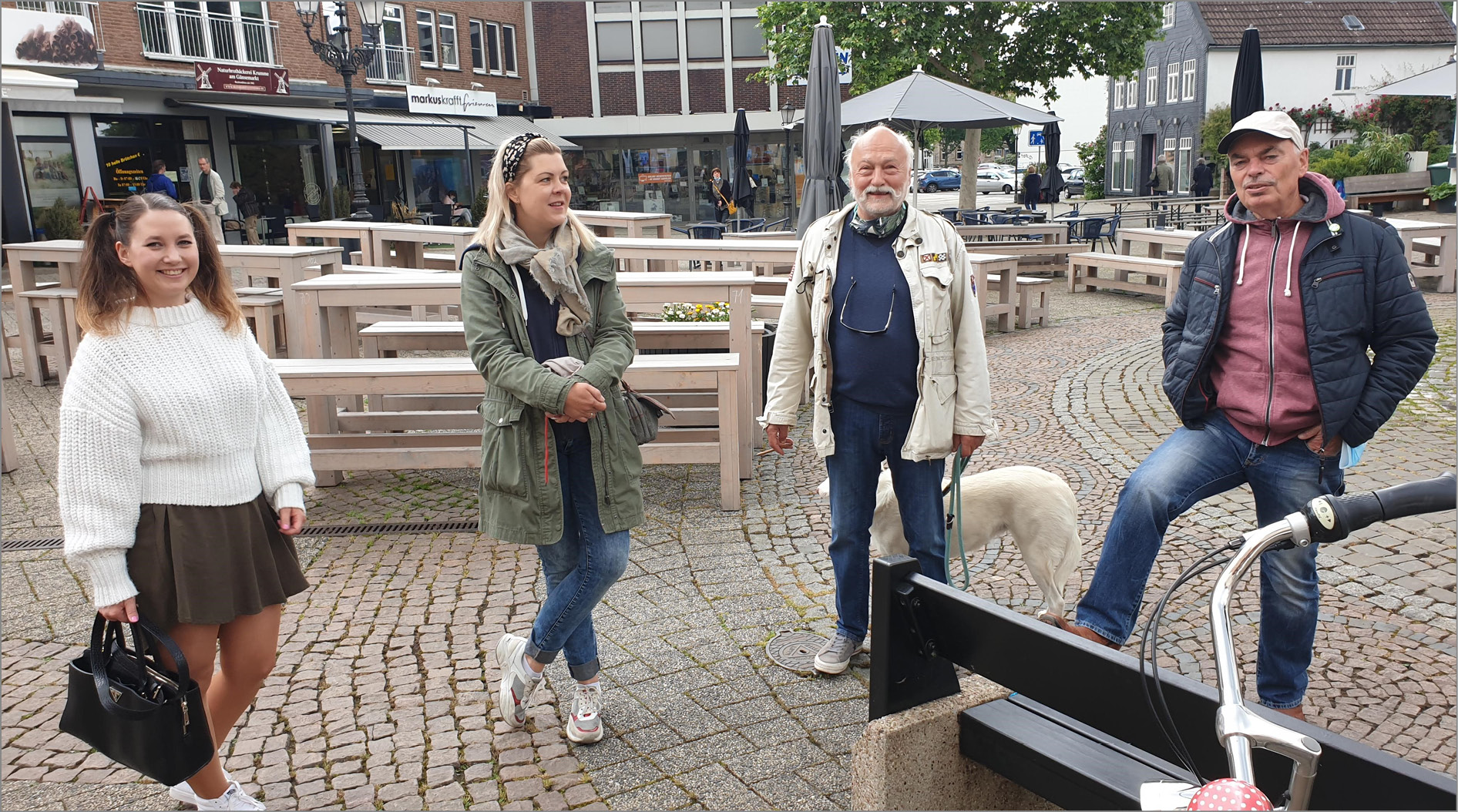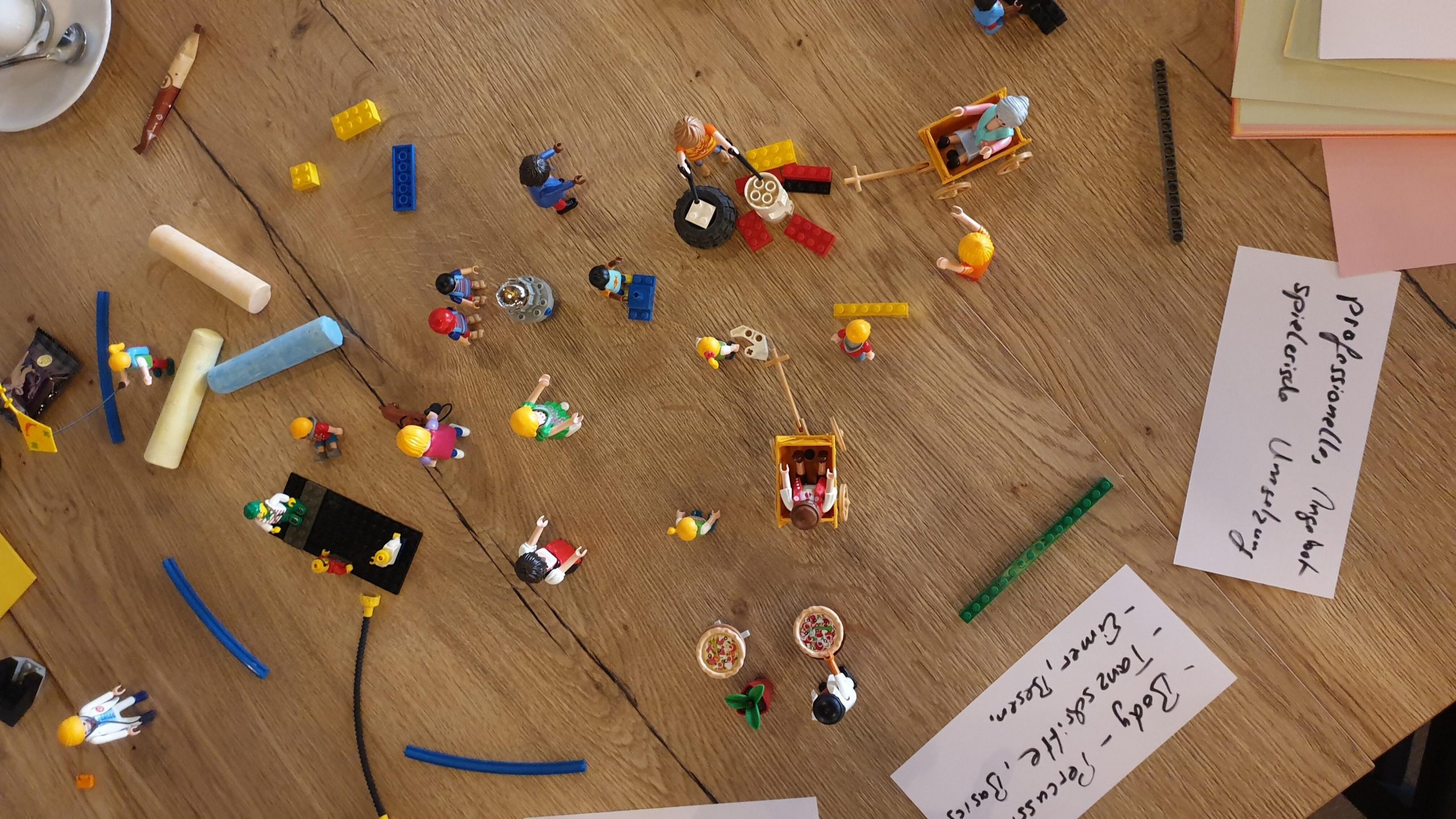- Start
- Social Makerthons in Practice
- MAKERTHON OWL - OPEN.PUBLIC.PLACES
- Future Conference DETMOLD.DIGITAL 2021
- Three Workshop-Phases: Dream it, Make it, Share it!
- Youth Participation: #CreateYourope
- The Makerthon concept as innovative tool in Higher Education Institutions
- Towards open urban innovation ecosystems
- About the author(s)
- References
Published 15.11.2021
Co-creating the Future
The Power of Social Makerthons in Urban Innovation Ecosystems
Keywords: Co-creation; collaboration; participation; creativity; innovation sprint
Abstract:
The COVID19 pandemic has shown that technical innovation is not enough when it comes to addressing complex societal challenges. Key qualifications in times of transformation are social innovation, creativity, and participatory open innovation processes. Social Makerthons can be applied to test co-creative methodologies, aiming to install more open and inclusive innovation ecosystems in cities and regions. Online or hybrid, Social Makerthons experiment with digital and physical spaces. In Social Makerthons, notions of experts and non-experts are broken-up. Researchers, citizens, policy makers and other stakeholders are seen as partners, even allies, in the need to respond to local and regional challenges. The article describes examples of four projects applying this format in urban environments during the pandemic.
Social Makerthons in Practice
In June 2020, city2science conducted the first MAKERTHON OWL – OPEN.PUBLIC.PLACES. In a hybrid event format, a diverse group of 60 participants collected and tested new ideas for public urban places in times of Corona and beyond. The project served as a testbed to demonstrate how local policy makers can integrate co-creative and inclusive innovation models for urban development processes. This was also the approach of the ZUKON2021 - an online Future Conference hosted by the municipality of Detmold: City representatives, researchers, entrepreneurs and citizens co-created solutions to challenges regarding the digital transformation. Within the project #CreateYourope the Social Makerthon format was tested with young Europeans, who developed ideas for a greener, more sustainable and more inclusive Europe. Finally, within the ERASMUS+ project Virtual hackathons the Social Hackathon format will be implemented at Higher Education Institutions in Europe.
The term Makerthon refers to a problem-solving-focused event where people come together around a specific challenge. The term is made up of the words maker and marathon. Maker are creative minds from various backgrounds, who are united by a shared focus on Do-It-Yourself projects and a joint search for solutions to existing technological or societal challenges. While traditional Hackathons often tend to focus on technical and digital solutions, Social Makerthons promote more diverse and creative approaches to tackling complex challenges. With their emphasis on open and inclusive governance models, Social Makerthons are an opportunity to engage various audiences in democratic forms of engagement. They are suited to promote social innovation and inclusion on a local as well as a European level.

MAKERTHON OWL - OPEN.PUBLIC.PLACES
While technical solutions provide answers to technology-related questions, social innovation (for more information on the term, please see references at the end of the article), creativity, and participatory co-creation processes are needed to face individual and societal challenges and foster behavioural change. In order to develop these processes on a national and global scale, local prototypes are needed to show new opportunities to work together in a world which is increasingly digital but still needs ideas for the future of physical meetings and spaces. In times of social distancing, people across the world still want to populate streets and squares, parks and other open spaces. In order to contribute ideas to the challenging situation during the pandemic, in which traditional gatherings in urban spaces were not allowed, city2science brought together a variety of stakeholders, inviting them to experiment with a hybrid event format, combining hands-on experimentation with physical and online meetings.
Within the first MAKERTHON OWL - OPEN.PUBLIC.PLACES, conducted from 5–7 June 2020, four institutions, representing academia, industry, policy making and civil society, in the region Ostwestfalen-Lippe (OWL, Germany) came together. These partners invited 60 stakeholders from different ages, genders and backgrounds, including scientists, innovators, start-ups, citizens, artists, students, designers and policy makers, to reflect on their urban and regional environments.
For three days, these stakeholders were invited to develop new ideas on how to open up public places in times of social distancing – meeting both online and in urban settings. Creative minds from different backgrounds designed and prototyped innovative ideas for streets and squares, churches and museums, parks and playgrounds in times of Corona and beyond. Examples of innovative prototypes the participants proposed include: energy trees in cities, parking lots as workspaces, citizen initiatives making culture accessible to different generations, barefoot paths and open sport spaces in parks, and public toilets as smart venues for creative interactive science communication activities.
Via the hybrid MAKERTHON OPEN.PUBLIC.PLACES, city2science aimed to conquer public spaces in cities and villages across the region, while infusing the maker spirit into local innovation processes. The project served as a testbed to demonstrate how local and regional policy makers could integrate co-creative and inclusive innovation models for urban development processes. Local actors created new alliances with their regional universities and learned to use new digital tools for their own internal dialogues.
Notions of experts and non-experts were broken-up, researchers were seen as partners, even allies, in the need to respond to regional challenges.
The project also demonstrated how physical and online meeting spaces can be combined in a creative and interactive way.


Future Conference DETMOLD.DIGITAL 2021
Between October 2020 and February 2021, city2science supported the department for digitalisation of the city of Detmold in preparing and organising a digital participatory event called ZUKON 2021. With this new format, the city of Detmold invited its citizens to help shape the digitalisation process in Detmold. Due to the Covid pandemic, the Future Conference was first planned as a hybrid event – mixing in-person meetings with possibilities of virtual participation. This concept allowed the organisers to adapt the format to the prevailing pandemic situation, thus finally creating a digital-only Future Conference that took place from 19–21 February 2021.
During the ZUKON 2021 the participants were working in three sub-groups focusing on different topics, all challenges concerning the digital transformation in Detmold:
- How does the digitalisation transform our urban transport?
- How does it affect our social lives?
- How could the digitalisation support the development of a creative administration willing to try out new approaches
These challenges had been defined in advance of the Future Conference as part of a digital participation process with the citizens of Detmold.
The ZUKON 2021 gathered representatives of the city administration, citizens, politicians, associations, representatives from the church, from arts and culture, students and scientists as well as economic actors.
The groups were also divided into different generations. All participants therefore brought their specific needs as well as their individual perspectives into the discussion. The diverse composition of the participants had a most positive effect – as was expressed in the participants’ feedback to the conference.
Three Workshop-Phases: Dream it, Make it, Share it!
Building upon project ideas submitted in the preceding online participation process, the participants collected first ideas in a Dream it-phase, inspired by external expert input in each group. In addition to creating concrete implementable projects, dreaming and utopian visions were explicitly encouraged. The virtual whiteboard-tool Mural was used for the creative brainstorming during the workshops. At the end of each workshop phase, all participants joined together to present their state-of-play and their results. In the Make it-phase, participants developed concrete prototypes and scenarios.
Ideas that were developed for challenge one – urban transport – included a reward system for the use of sustainable means of transportation, expansion of the use of cargo bikes in the inner city, a mobility app for the whole urban transport system and a new and innovative ticketing system for the city.
In challenge 2, addressing the impacts of digitalization on social life, the main focus was on making information more easily accessible for all citizens – a digital display case was one approach to meet this goal. The participants agreed that the virtual and the physical space should be combined in a creative way. Ideas in that regard were QR-codes in public places like on art works and monuments. To also include future audiences who are not (yet) versed in the use of technology, a low-threshold service could be based in the inner city. Participants emphasized that the different needs and specifics of the various districts in Detmold should be considered in all undertakings.
In challenge 3, participants collected ideas how to make public administration more approachable and present. Ideas were a new, more visible communication strategy within social media, and a new platform to communicate with citizens, where they are able to choose which information they would like to receive from their local public administration.
The Future Conference ended on Sunday with a digital Sunday brunch. Despite a wonderful sunny spring morning, about 45 participants met up in the Zoom conference room at 11 a.m. Together, they reflected on the results of the day before and developed a vision of “Detmold - Smart City of the Future” in form of a newspaper article to be published in 2025 in Hasselt – the belgian sister city of Detmold. The participants were encouraged to find headlines on how the Smart City Detmold could be described from an external view in 2025: “car-free inner city”, “meeting point of all generations” or “vertical farming in and at unoccupied buildings in the inner city” are only some of the subject headings the participants found for their future city.
Youth Participation: #CreateYourope
The digital Social Makerthon #createYourope took place from 7–8 May 2021. The event was selected to be part of the European Week North Rhine-Westphalia 2021 by the Federal Ministry for National, European and International Affairs. In this Makerthon, young people from Germany and Poland aged 16–22 years developed ideas for a greener, more sustainable and more inclusive Europe.
The new format was organized by the Ruhr Regional Association (RVR), Department for Education and Social Affairs together with the Department for European Affairs. The conceptualization, facilitation and implementation of the event was conducted by city2science, in collaboration with the European Science Engagement Association (EUSEA).
During a dynamic idea sprint, participants co-created ideas for sustainable innovations in the Ruhr Metropolitan Area. The goal was to develop ideas on how to make the Ruhr Region and Europe as a whole greener, more sustainable and participatory. #CreateYourope was supported by inputs from experts from science and politics, including Dr. Henning Wilts from the Wuppertal Institute for Climate, Environment and Energy, and facilitated by members of the education network teamGLOBAL.
After a welcoming by the RVR regional director Carola Geiß-Netthöfel, the Makerthon started with an inspiring keynote by Philipp Offergeld, project manager for climate protection at the Mercator Foundation. In the following, the participants discussed two challenges for which they also received input from experts in the field.
- Challenge 1: Sustainable Innovations and Upcycling
- Challenge 2: Europe 2030 and the future of mobility
The ideas the young people developed ranged from urban gardening networks, sustainability festivals in collaboration with researchers and the local community, to innovations for public transport and DIY-approaches for tackling climate change and environmental pollution. The ideas will now be further developed by the Ruhr Regional Association (RVR).
The Makerthon concept as innovative tool in Higher Education Institutions
Within the ERASMUS+ - project VirHack (Virtual Hackathons) the concept of Social Makerthons or Hackerthons shall now be applied to Higher Education Institutes in Europe. This project started in March 2021 with city2science being part of the consortium composed of three universities, one research institute and four SMEs. The project aims at designing and developing an innovative learning platform. The co-creation of solutions in a digital or hybrid environment will bring together students, researchers and stakeholders from outside academia.
The consortium will create a training plan and materials for is target groups to use to prepare a virtual hackathon on any topic based on design and systems thinking. Currently, the partners of the consortium are designing the concept that will be the basis of the hackathons that are being developed within the course of the project.
Towards open urban innovation ecosystems
The Social Makerthon methodology has proven to be a useful tool for digital or physical participation and co-creation for a wide range of actors in local innovation ecosystems. It can also be an effective tool for co-creation and engagement in Higher Education Institutions.
The complexity of the pandemic has revealed that the established notions of excellence, governance and knowledge-transfer need to be challenged in academic and local innovation processes, giving room to a broader understanding of innovation and a wider range of partners.
Moving away from topic- driven to challenge-driven innovation, stakeholders today need to go beyond expert-driven hierarchical innovation and governance models. Instead, engaged researchers, policy makers, economic stakeholders and citizens from diverse generations and socio-cultural backgrounds should be motivated and trained to become active members in multi-disciplinary teams, joining forces with each other to develop innovative and applicable solutions in a co-creative way.

References
Further Information on the projects mentioned in the article:
CreateYourope: https://www.city2science.de/en/portfolio-items/create-yourope.
ERASMUS+-project “Virtual hackathons”: https://www.city2science.de/en/portfolio-items/erasmus-virtual-hackathons.
Future conference DETMOLD.DIGITAL: https://www.city2science.de/en/portfolio-items/participatory-event-detmold-digital. & https://consul.detmold-mitgestalten.de/legislation/processes/5/milestones. (German)
MAKERTHON OWL OPEN.PUBLIC.PLACES: https://www.city2science.de/en/portfolio-items/makerthonowl.
Further information on the hackerthon format and the approach of open innovation processes:
Definition of Social Innovation: Video Becoming a Changemaker: Introduction to Social Innovation: https://www.youtube.com/watch?v=TcWYG64WO20.
Open innovation in Higher education institutions: https://innosci.de/wp-content/uploads/210617_innOsci_Studie_Openness_international.pdf (German)
Practical Tips on how to conduct a good hackerthon: https://paderta.com/hackathons-besser-machen/. (German)
Talk on the hackathon format, inclusion, target groups and innovation: Building joyful futures by Alexis Hope, re:publica 2019, https://19.re-publica.com/de/session/building-joyful-futures.